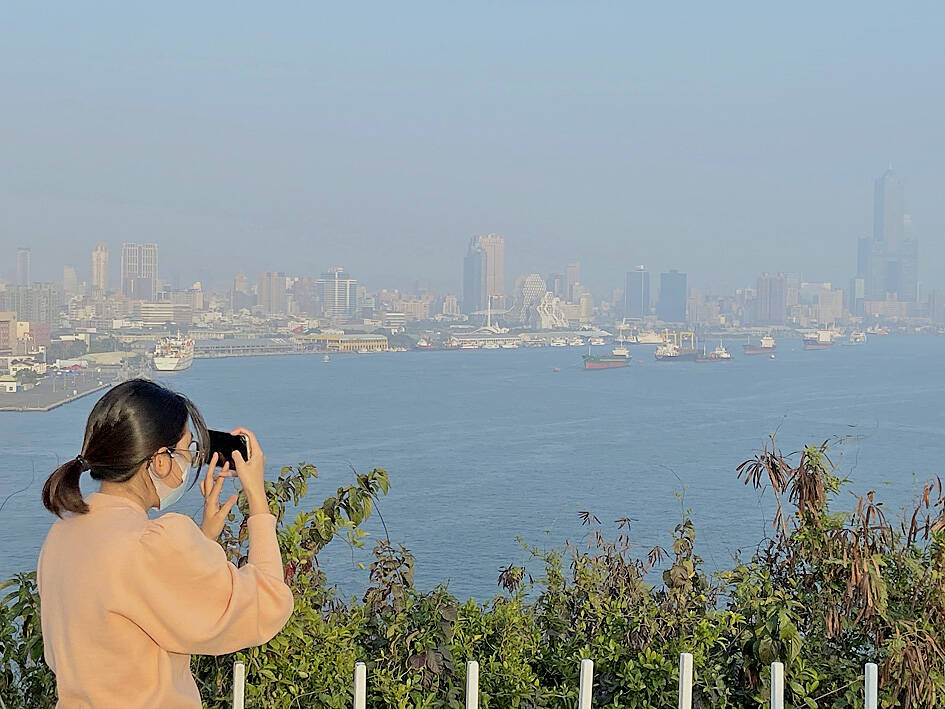Government measures to control air pollution have effectively lowered the density of main pollutants, with more than 90 percent of air quality observation stations reporting a gradual decline in the density of PM2.5 (particulate matter measuring 2.5 micrometers or smaller in diameter), PM10, nitrogen dioxide, sulfur dioxide and carbon monoxide, the National Health Research Institutes (NHRI) said yesterday.
However, only 38 percent of the observation stations showed an improvement in ozone density, associate investigator Chen Yu-cheng (陳裕政) told a news conference to present the results of the institutes’ 10-year study.
Moreover, three stations even reported a gradual increase, he added.

Photo: CNA
The density of PM2.5 fell from 31.7 micrograms per cubic meter (mcg/m3) in 2007 to 21.47mcg/m3, while deaths caused by lung cancer dropped 4.26 percent, Chen said.
Deaths caused by other chronic diseases fell substantially, including 6.91 percent for chronic obstructive pulmonary diseases, 6.56 percent for ischemic heart diseases and 7.31 percent for strokes.
A comparison of the health status of elderly people exposed to an environment with PM2.5 density of 25mcg/m3 with that of 32mcg/m3 showed that their grip strength and muscle mass decreased by 1.7 percent and 1.3 percent respectively, while their body fat increased by 2.4 percent, Chen said.
Based on the study, Taiwan would obtain the maximum benefit between the cost of economic development and the cost of improving public health if it could reduce PM2.5 concentrations to 12.5mcg/m3 — at which point both factors would be equal, Chen said.
If Taiwan hopes to reach the green sustainable development goal set by the UN, in which age-standardized attributable mortality rate caused by PM2.5 should be less than or equal to 18 per 100,000 people, the density should be further reduced to an annual average of 12.1mcg/m3, he said.
The Ministry of Environment on April 29 said that it would revise air quality standards after the results of the NHRI study are released.
The new standard for PM2.5 would be set at 12mcg/m3 after taking into account standards set in other countries, the ministry said.
Meanwhile, the air quality indicator would be revised in the second half of this year as well, it said.

ENDEAVOR MANTA: The ship is programmed to automatically return to its designated home port and would self-destruct if seized by another party The Endeavor Manta, Taiwan’s first military-specification uncrewed surface vehicle (USV) tailor-made to operate in the Taiwan Strait in a bid to bolster the nation’s asymmetric combat capabilities made its first appearance at Kaohsiung’s Singda Harbor yesterday. Taking inspiration from Ukraine’s navy, which is using USVs to force Russia’s Black Sea fleet to take shelter within its own ports, CSBC Taiwan (台灣國際造船) established a research and development unit on USVs last year, CSBC chairman Huang Cheng-hung (黃正弘) said. With the exception of the satellite guidance system and the outboard motors — which were purchased from foreign companies that were not affiliated with Chinese-funded

PERMIT REVOKED: The influencer at a news conference said the National Immigration Agency was infringing on human rights and persecuting Chinese spouses Chinese influencer “Yaya in Taiwan” (亞亞在台灣) yesterday evening voluntarily left Taiwan, despite saying yesterday morning that she had “no intention” of leaving after her residence permit was revoked over her comments on Taiwan being “unified” with China by military force. The Ministry of the Interior yesterday had said that it could forcibly deport the influencer at midnight, but was considering taking a more flexible approach and beginning procedures this morning. The influencer, whose given name is Liu Zhenya (劉振亞), departed on a 8:45pm flight from Taipei International Airport (Songshan airport) to Fuzhou, China. Liu held a news conference at the airport at 7pm,

Taiwan was ranked the fourth-safest country in the world with a score of 82.9, trailing only Andorra, the United Arab Emirates and Qatar in Numbeo’s Safety Index by Country report. Taiwan’s score improved by 0.1 points compared with last year’s mid-year report, which had Taiwan fourth with a score of 82.8. However, both scores were lower than in last year’s first review, when Taiwan scored 83.3, and are a long way from when Taiwan was named the second-safest country in the world in 2021, scoring 84.8. Taiwan ranked higher than Singapore in ninth with a score of 77.4 and Japan in 10th with

GRIDLOCK: The National Fire Agency’s Special Search and Rescue team is on standby to travel to the countries to help out with the rescue effort A powerful earthquake rocked Myanmar and neighboring Thailand yesterday, killing at least three people in Bangkok and burying dozens when a high-rise building under construction collapsed. Footage shared on social media from Myanmar’s second-largest city showed widespread destruction, raising fears that many were trapped under the rubble or killed. The magnitude 7.7 earthquake, with an epicenter near Mandalay in Myanmar, struck at midday and was followed by a strong magnitude 6.4 aftershock. The extent of death, injury and destruction — especially in Myanmar, which is embroiled in a civil war and where information is tightly controlled at the best of times —